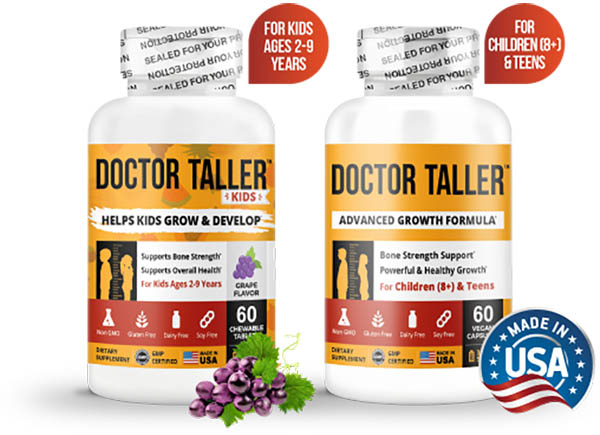During the age of 6, children experience a significant and transformative phase in their growth process. This period is defined by notable changes in height, weight, and overall body composition, showcasing the rapid progression from early childhood to middle childhood. If you’re interested in learning how to best support the optimal growth of a 6-year-old, this article is designed to provide you with valuable insights. Continue reading to uncover practical strategies for achieving this goal.
Nurturing Growth Through Nutrition
Creating a comprehensive dietary plan involves incorporating a diverse range of food groups to ensure the essential intake of nutrients. Load their plates with a variety of vibrant fruits and vegetables, whole grains, lean proteins, and beneficial fats. These components offer a treasure trove of vitamins, minerals, fiber, and antioxidants that play a crucial role in their growth and developmental journey.
Elevating Protein Intake
Proteins play a pivotal role in tissue and organ growth, repair, and maintenance. Incorporate lean meats (chicken, turkey, fish), dairy products (milk, cheese, yogurt), eggs, legumes (beans, lentils, chickpeas), and nuts into their diet. These sources furnish the necessary amino acids for muscle development, supporting their active lifestyle.

Prioritizing Calcium for Strong Bones
Calcium is crucial for the formation of robust bones and teeth during childhood. Dairy products like milk, cheese, and yogurt serve as excellent calcium sources. For lactose-intolerant or vegan children, consider fortified plant-based milk (soy, almond, oat milk) and calcium-fortified foods (tofu, cereals, orange juice) to ensure adequate calcium intake.
Essential Vitamins and Minerals
Vitamins and minerals are vital for various bodily functions and significantly contribute to the growth and development of 6-year-olds.
- Vitamin A: Found in carrots, sweet potatoes, spinach, and other fruits and vegetables, it supports healthy vision and immune function.
- Vitamin C: Abundant in citrus fruits, berries, and bell peppers, it boosts their immune system.
- Vitamin D: Obtained from sunlight exposure and fortified foods, it aids calcium absorption and bone health.
- Iron: Present in lean meats, poultry, fish, beans, and fortified cereals, it enhances cognitive development and prevents iron deficiency anemia.
Staying Hydrated
Encourage ample water consumption throughout the day, especially during physical activities. Limit sugary beverages like soda, fruit juices, and sports drinks, which can contribute to weight gain and dental issues. Offer healthier alternatives like herbal teas, diluted fruit juices, or flavored water to make hydration enjoyable.
Cultivating Physical Activity
Regular exercise is essential for 6-year-olds to develop strong muscles and bones, maintain a healthy weight, boost cardiovascular health, enhance coordination and balance, and improve overall physical fitness. Here are some suitable activities:
- Swimming: Enhances muscle strength and cardiovascular fitness while ensuring water safety through swimming lessons.
- Cycling and Scootering: Promotes balance and coordination; safety gear like helmets, knee pads, and elbow pads are essential.
- Yoga and Stretching: Improves flexibility, balance, and body awareness, and aids relaxation and concentration.
- Sports and Team Games: Soccer, basketball, baseball, and similar sports enhance coordination, teamwork, and social skills.
Promoting Adequate Sleep and Rest
Establishing a healthy sleep routine is crucial, with 6-year-olds needing 9 to 11 hours of sleep per night. Quality sleep supports growth hormone release, aiding physical development and tissue repair.
- Bedtime Routine: Develop soothing activities like reading, warm baths, or calm engagement to signal wind-down time.
- Optimal Sleep Environment: Ensure a dark, quiet, comfortable room; consider blackout curtains and white noise machines.
- Screen Time Limit: Avoid stimulating screens at least an hour before bedtime.
- Consistent Schedule: Set regular bedtime and wake-up times to regulate their internal clock.
- Physical Activity: Encourage daytime physical activity for better sleep quality, avoiding intense exercise close to bedtime.
- Caffeine Restriction: Prevent caffeine consumption in the afternoon and evening, as it can disrupt sleep.
- Comfortable Sleep Setup: Provide a comfortable mattress, pillows, and appropriate sleepwear.
Healthcare and Monitoring
Healthcare and monitoring are crucial aspects of ensuring the well-being and development of children. Regular medical check-ups and proactive monitoring can help identify any potential issues early on and ensure that children are growing and developing properly. Here’s how to approach healthcare and monitoring for children:
- Regular Pediatrician Visits: Schedule regular visits with a pediatrician, especially during the early years. These visits allow the doctor to track your child’s growth, development, and overall health. The frequency of visits might decrease as the child gets older, but regular check-ups remain important.
- Vaccinations: Make sure your child receives all recommended vaccinations on schedule. Vaccinations protect children from various preventable illnesses and contribute to their overall well-being.
- Growth Tracking: Pediatricians monitor your child’s growth by measuring their height, weight, and head circumference at each visit. This helps ensure that they are growing within expected ranges and identifies any potential growth issues.
- Developmental Milestones: Pediatricians assess your child’s developmental milestones, such as motor skills, speech, and cognitive abilities. If any delays are observed, early intervention can be recommended.
- Nutrition and Diet: Discuss your child’s diet and nutrition with the pediatrician. They can provide guidance on age-appropriate foods and address any concerns about dietary habits.
- Vision and Hearing: Regular vision and hearing screenings are important to identify any issues that might affect your child’s learning and development.
- Dental Care: Dental health is an integral part of overall well-being. Schedule regular dental check-ups and promote good oral hygiene habits.
- Behavioral and Emotional Health: Monitor your child’s behavior and emotions. If you notice persistent changes in mood, behavior, or social interactions, discuss them with the pediatrician. Early intervention can be important for addressing emotional and behavioral concerns.
- Safety Measures: Ensure your home is childproofed and safe to prevent accidents. Use age-appropriate car seats, seat belts, and other safety measures during travel.
- Screen Time: Monitor and limit screen time, especially for young children. Excessive screen time can affect physical and mental development.
- Communication: Maintain open communication with the pediatrician. Share any concerns you have about your child’s health, behavior, or development.
- Parental Observation: Pay attention to any changes in your child’s health or behavior. You know your child best, so if something seems unusual, don’t hesitate to seek professional advice.
- Medical Records: Keep organized records of your child’s medical history, including vaccinations, illnesses, and treatments. This information can be valuable for future reference.
- Emergency Preparedness: Know how to respond in case of medical emergencies. Have important contact numbers and first aid supplies readily available.

Considering Multivitamins
Multivitamins are dietary supplements that contain a combination of vitamins and minerals. They are designed to provide additional nutrients that might be lacking in a person’s diet. While multivitamins can be helpful in certain situations, it’s important to approach them with caution, especially when considering them for children. Here are some considerations:
- Consult a Healthcare Professional: Before giving any supplements, including multivitamins, to a child, it’s essential to consult with a pediatrician or a qualified healthcare professional. They can assess your child’s specific nutritional needs and advise whether supplementation is necessary.
- Nutrient-Rich Diet First: A balanced and varied diet should be the primary source of nutrients for children. Whole foods provide not only vitamins and minerals but also other essential nutrients and dietary fiber that are important for growth and development.
- Specific Nutrient Deficiencies: Multivitamins should not be used as a substitute for a poor diet or to address specific deficiencies unless recommended by a healthcare professional. If there’s a known deficiency, a targeted approach with individual supplements might be more appropriate.
- Age-Appropriate Supplements: If a healthcare professional recommends a multivitamin, make sure it’s appropriate for your child’s age and nutritional needs. Children’s multivitamins are formulated differently based on age groups.
- Read Labels: Be mindful of the ingredients in the multivitamin. Some vitamins and minerals can interact with each other or with medications, so it’s important to understand what’s in the supplement.
- Avoid Overdosing: Taking excessive amounts of certain vitamins and minerals can be harmful. It’s possible to get too much of certain nutrients, leading to potential health risks.
- Quality and Safety: Choose reputable brands that adhere to quality and safety standards. Look for products that have been independently tested for quality and purity.
- Individual Needs: Every child is different. Some children might have specific dietary restrictions, allergies, or medical conditions that affect their nutritional needs. A healthcare professional can provide personalized recommendations.
- Regular Monitoring: If your child starts taking a multivitamin, continue to monitor their health and well-being. If you notice any adverse effects or changes, consult a healthcare professional.
- Not a Magic Solution: Multivitamins are not a guaranteed way to improve growth or health. They should complement a healthy diet rather than replace it.
Limiting Stress
Limiting stress in children is important for their overall well-being, development, and growth. While some level of stress is a normal part of life, chronic or excessive stress can have negative effects on physical and mental health. Here are some strategies to help limit stress in children:
- Create a Stable Environment: Children thrive in stable and predictable environments. Establish routines for daily activities such as meals, sleep, and playtime. Consistency helps children feel secure and reduces uncertainty.
- Open Communication: Encourage your child to express their feelings and thoughts openly. Create an environment where they feel comfortable talking about their concerns and fears. Listen actively and offer reassurance and support.
- Manage Over-Scheduling: While extracurricular activities can be beneficial, over-scheduling can lead to stress and exhaustion. Allow your child to have downtime for relaxation, play, and rest.
- Promote Playtime: Play is essential for children’s development. Encourage unstructured playtime where they can explore, imagine, and create without the pressure of achieving specific goals.
- Limit Media Exposure: Screen time, especially exposure to violent or distressing content, can contribute to stress in children. Monitor and limit the content your child consumes, and prioritize educational and positive media.
- Teach Coping Skills: Help your child develop healthy coping mechanisms for managing stress. Breathing exercises, mindfulness, and creative outlets like drawing or writing can be effective ways to deal with stress.
- Encourage Healthy Habits: A balanced diet, regular physical activity, and sufficient sleep can help regulate stress levels. These habits contribute to overall well-being and resilience.
- Model Healthy Behavior: Children often learn by observing adults. Model effective stress management strategies by demonstrating how you handle stress in a healthy way.
- Celebrate Achievements: Celebrate your child’s achievements, whether big or small. Positive reinforcement boosts self-esteem and confidence, reducing the impact of stress.
- Foster Social Connections: Strong social connections provide emotional support. Encourage your child to develop and maintain friendships, which can help reduce feelings of isolation and stress.
- Limit Adult Worries: Children are sensitive to their caregivers’ stress. Shield them from adult worries and conversations that might cause unnecessary anxiety.
- Practice Gratitude: Encourage your child to focus on positive aspects of their life by practicing gratitude. This mindset shift can help them develop resilience in the face of stressors.
- Seek Professional Help: If you notice persistent signs of stress or anxiety in your child, consider consulting a pediatrician or mental health professional for guidance.
In Conclusion
Optimizing the growth potential of a 6-year-old involves a holistic approach. While there are no quick fixes for height growth, a supportive environment can significantly impact their overall health and well-being. Remember that each child is unique, and growth patterns vary. Focus on balanced nutrition, physical activity, adequate sleep, and medical guidance to ensure their optimal development.
- Related post: How tall is 11 year old?



